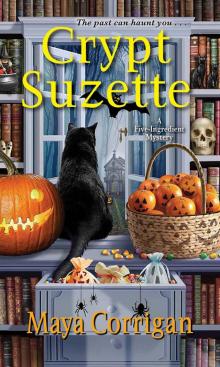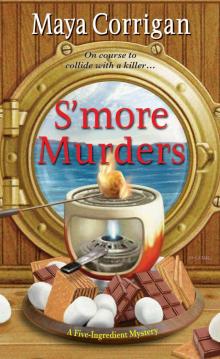- Home
- Maya Corrigan
By Cook or by Crook Page 4
By Cook or by Crook Read online
Page 4
“What?” Bad enough he offered her services for free. Now he was setting her up. Val flipped a crab cake and smacked it down so hard the oil splattered. “I told you I’d drive myself.”
“Go easy on those crab cakes. Listen, I know you’re worried about what you’ll find at Monique’s house. If there’s a problem, a younger man will be more help than your grandfather. Besides, I want to take a nap after lunch.”
She couldn’t fault his reasoning. “Just don’t take up matchmaking, okay?” She would give Gunnar a chance to back out of the mission her grandfather had given him.
“In case you’re interested, he’s not married. Don’t turn purple, Val. I asked a casual question, if his wife enjoyed fishing too. I call that clever.”
“I call it nosy.” But also helpful. He’d managed to find out something Val wanted to know. Even so, his interference steamed her.
She got over it once they were seated at the table and the sweet crabmeat kissed her tongue. During lunch she and Granddad discussed the house repairs that still needed to be done.
The doorbell rang while she was washing the skillet.
“I’ll get it.” Granddad left the kitchen.
He came back a minute later. “Gunnar’s on the porch. I tried to get rid of him when I saw who he was. He won’t leave without talking to you.” Granddad clutched her shoulders. “Don’t go with him. He’s dangerous!”
Chapter 4
“Calm down, Granddad.” Val set the skillet in the dish drainer and dried her hands. Last night she would have laughed at the idea of any real danger in Bayport. Now she knew better. “What makes you think Gunnar’s dangerous?”
“Saturday night when I left the Mentors Club dinner, I saw two lowlifes hanging around the docks together. A swarthy hulk with a big mustache like a pirate and Gunnar in tattered jeans. Mean bullies, waiting to pick on somebody. I steered clear of them.”
Understandable. Gunnar’s face would daunt most people even if he didn’t have a pirate with him. “You can’t judge a person based on appearances. I know Gunnar isn’t a mean bully. I spent two hours with him on the tennis court. Mean players blame their partners. Bullies intimidate their opponents. He didn’t do that. He was a good sport, win or lose.”
Granddad rolled his eyes. “He was just trying to impress you. Like today when he shows up here in a suit.”
“In grungy clothes he’s a troublemaker. In a suit he’s a phony. What can he wear to make you happy?”
“It’s not just his clothes. You know a man by the company he keeps.”
“You know nothing about his company on the docks beyond the man’s build, complexion, and mustache. That’s not enough to condemn both of them. After talking to Gunnar on the phone, you liked him enough to invite him here. Let’s talk to him now.” She tugged her grandfather toward the porch, where he’d left Gunnar to swelter. No stamp of approval, no air conditioning.
Gunnar sat on a wicker settee, rolling up his shirtsleeves, his jacket folded on the seat beside him. He stood up when he saw her. His smile made the rugged terrain of his face less forbidding. “Good to see you again, Val.”
She shook his extended hand. “I’m glad to see you too, and surprised. I thought you were going back to D.C. for work.”
“I did go, and then decided to take some time off this week. I drove here straight from a meeting.”
That explained the suit. Val gave Granddad an I-hope-you’re-satisfied look. “My grandfather saw you at the town dock Saturday night. You and a guy with a mustache.”
“Right. We were supposed to go night fishing. The captain canceled the trip because of rough water.”
Granddad stroked his chin. “Can’t say as I blame him. He’d have to swab the deck after you weekenders upchucked into the wind.” He ignored Val’s glare. “What line of work you in, Gunder?”
“Gunnar. Accounting.”
“Business must be slow for you to take off when you like. You got your own firm?”
“Not yet, though I may before long. For now, I have a government job and a lot of accumulated leave.”
“That so?” Granddad crossed his arms and lifted his chin. “What part of the government?”
Gunnar looked amused at the inquisition. “Treasury. Internal Revenue Service.”
Granddad ran his finger under his collar and stared at the porch floor. If Val were an IRS auditor, she’d take his body language as a “tell” and comb through his tax returns.
She wiped sweat from her forehead. Why was she thinking about taxes when she had a murder and a missing cousin to worry her? “Gunnar, I know my grandfather recruited you to drive me to my cousin’s house, but I can drive myself.”
“She doesn’t want to impose on . . . I mean . . .” Granddad trailed off. He must have known he’d given Gunnar an opening and couldn’t think of a way to retract it.
Gunnar smiled at Val. “You’re not imposing. I can’t check into my B&B yet anyway, and I’d enjoy your company.”
Her spirits, in the dumps since finding Nadia dead, lifted slightly. “Thanks. Let’s go then.” She grabbed her bag from the hall.
Her grandfather acted as if she’d included him in her “let’s go.” He followed them to the curb and eyed Gunnar’s red Miata. “I guess some people don’t need a practical car.” He glanced at his Buick parked in front of Gunnar’s two-seater.
Uh-oh. Val guessed what he’d say next, suggest they all drive together in the behemoth Buick. Bad enough that he set her up with Gunnar. Now he would chaperone her too. She touched his shoulder. “I’ll call you from Monique’s. I know you’re concerned about . . . things.”
His eyes locked on hers. “Less concerned than I was, but take care.”
She took his words as acceptance, though not approval, of her leaving with Gunnar. Granddad turned back toward the house.
Gunnar held out the car keys to Val. “Why don’t you drive? You know the way.”
Six months ago she would have grabbed the keys to a sports car with no second thoughts. “You drive. You know your car.” And if you knew me, you wouldn’t trust me with it.
Val directed Gunnar along side streets to avoid the traffic in the historic district. She watched his right hand cup the gearshift, the dark hairs curling over his cocked wrist. Something stirred in her. While his face had rough patches, that hand looked smooth and deft.
She pointed to a row of shops at the edge of town. “You see the art gallery there? It used to be my grandfather’s fish market. From seafood to seascapes, Bayport’s history in a nutshell. Once upon a time the folks here built ships and caught oysters. Now they cater to weekenders decorating vacation homes.”
“The shops changed, the small-town atmosphere didn’t. People like your grandfather still feel at home here. By the way, I enjoyed meeting him.”
She didn’t hear any sarcasm in his voice. He couldn’t have missed the negative vibes Granddad had beamed at him. “You saw him in high curmudgeon mode. I wish I could tell you he isn’t always like that, but I’d be lying. Turn left at the next intersection. Once we’re on the peninsula, you’ll have a view of the Chesapeake. Bayport, despite its name, isn’t on the bay.”
“But the river and creek feed into it. Close enough.” Gunnar downshifted. “Why are you anxious to check on your cousin? Is she elderly?”
“No, Monique’s a year older than me. She’s a second cousin, and since I don’t have sisters or first cousins, she stands in for them. I have to take good care of her.”
He turned onto the peninsula road. “Her name sounds French.”
“Her parents came from around here and moved to Canada before she was born. Monique grew up bilingual. Her mother came back to this area ten years ago to take care of a sick relative. Monique came with her, married a local man, and stayed.” Val chewed her fingernails. “Monique’s husband and kids are away now, and she’s not answering her phone.”
“Maybe she went out and doesn’t have her cell phone or didn’t juice it up.”
The car edged off the pavement onto the shoulder.
Gunnar steered back onto the road. “You said a tennis player was murdered?”
“I did.” But unlike him, she’d emphasized the crime, not the sport. She peered sideways at him.
He returned her look. “What’s the dead woman’s name?”
“Nadia Westrin. You met her Sunday night when we played mixed doubles. Petite with short hair.”
He drummed his fingers on the wheel. “Oh, yeah. The real estate agent. She offered to sell me a house two minutes after she met me. How was she killed?”
“The police haven’t released that information yet.” A good answer, truthful and evasive at the same time. He’d probably ask more questions about the murder unless she changed the subject. “On the porch you talked about opening an accounting practice. Is that in the near future?”
“Sooner than I expected. My great-aunt Gretchen died and left me some cash. When the inheritance comes through, I’ll have enough to quit my job and take some risks.”
“Cool. We should all have a Great-Aunt Gretchen.”
“You wouldn’t say that if you’d ever met Gretchen.” Gunnar gave Val a crooked smile and glanced at her crossed legs. “You told me you moved here a few months ago, but didn’t say where you lived before or what you did.”
“I worked for a New York publisher, promoting their cookbooks. I did publicity for celebrity chefs.”
“A good job for someone who’s into cooking.”
“I was, but the experience turned me off pretentious gourmet cuisine. I decided to write my own cookbook with recipes that don’t require exotic ingredients and lots of prep. The job didn’t leave me any time to do that. I came home exhausted at night.” Val pointed to the cornfields flanking the road. “I missed serene sights like this. After a decade in the city, I burned out.”
“I like fields of grain if they’re near large bodies of water. Where I grew up in the Midwest, the fields go on and on.” Gunnar slowed down and watched an osprey until it flew out of sight. “You have time to play singles this week?”
“Sure.” Val was glad he’d be around for a few days. She wouldn’t mind seeing more of him and, judging by how often he looked at her bare legs, he wouldn’t mind seeing more of her either. “The café’s open for breakfast and lunch. After I close it at two, I usually hang around to clean up or prepare things for the next day. Do you want to play late in the afternoon?”
“I’ll try to reserve a court for tomorrow.”
“Maybe by then the police will have cleared out. Today they’re probably combing the club for evidence and murder suspects.”
“The club? Why there?”
Because of the weapon, which Val couldn’t mention. She cracked open the car window and let in a moist breeze. “Nadia spent a lot of time playing tennis and made some enemies at the club.”
“Arguments on the tennis court don’t lead to murder.”
“Says who? The Italian painter Caravaggio got into a fight after betting on a tennis game. He killed his opponent in a duel.”
Gunnar’s mouth turned down in skepticism. “You made that up.”
“Did not. I OD’d on trivia games in my misspent youth. I remember a lot of random factoids.” And forget important things, like how she’d nearly killed the man who’d entrusted her with his life and his vintage car.
“Okay, but that duel was over money, not tennis. Greed explains most crimes. The police will look into who benefits from Nadia’s death.”
“Gee, you sound like an accountant. Don’t put your money on greed as the motive in this case. Nadia drove a Lexus to impress her clients, but she lived in a small house. I doubt she was rich.”
Gunnar slowed down as the road narrowed and ran alongside the bay. “Rich is relative. Some people kill for running shoes or over a sports bet, like that Italian painter.”
They lapsed into silence. Val expected him to show interest in the water views and the fishing prospects, but he didn’t. He just stared straight ahead. Maybe news of the murder had dampened his enthusiasm for the Eastern Shore as a weekend getaway.
Monique’s sprawling ranch house came into view toward the end of the peninsula.
Val’s shoulders tensed at the sight of the white van in the driveway. “Her car’s here.” Not necessarily good news. This morning Nadia’s car had sat in the driveway too.
Gunnar parked on the road next to the mailbox. As they climbed from the Miata, Monique came around the side of her van and waved. “Hi, there.”
Val waved back and spoke to Gunnar across the hood of the car. “Monique must not have heard about Nadia or she wouldn’t look so carefree. I’ll have to break the news.” Though she’d rather not have a witness when she warned her cousin about the police.
Monique met them at the top of the driveway. She introduced herself to Gunnar and shook hands with him. “Nice to meet you. What brings the two of you out here?”
“I’ve been calling you since this morning,” Val said. “Where have you been?”
“My French conversation group and then a sidewalk sale in Salisbury. I forgot to turn on my phone after the meeting. You won’t believe the bargains I found for the kids.” Monique gestured toward the back of the van stuffed with shopping bags.
Only Monique could go to a sidewalk sale in the heat and still look cucumber cool, long and slim in a green sheath dress. Her hair, golden brown like buttered toast, stayed put in its ponytail, not a wisp out of place.
Val envied those tame strands. Her own hair spiraled down, coiled out, or frizzed up, depending on weather and whim. “How come on muggy days, you’re the poster girl for hair conditioner, and I’m modeling a fright wig?”
Monique grinned. “You’re not even close to a fright wig.”
“But if you want one,” Gunnar said, “we can drive back to town with the top down.” A buzz came from his shirt pocket. He pulled out his cell phone and glanced at it. “Excuse me.”
He stepped away to stand under the shade of a tree and studied the display, apparently reading a text or an e-mail.
Monique turned her back to him. “In case you were wondering, but afraid to ask,” she spoke in an undertone, “I didn’t burn the racket at Nadia’s house.”
“Good.” Whew. “How did you hear about the fire?”
“Chatty called me yesterday morning after talking to Nadia. You saw the whole thing. I’m surprised you didn’t tell me about it. What were you doing at Nadia’s place Sunday night anyway?”
Val ignored her cousin’s accusatory tone. “Nadia needed a ride home from the club. She asked me to keep quiet about the burning racket. I wonder why she blabbed to Chatty.” The nickname suited Chatty Ridenour’s personality far better than her given name, Charity.
“Because she wants her to ferret out the culprit, and of course, I’m first on the list.” Monique glanced back at Gunnar, who was pressing buttons, texting a return message. “Who is that guy? How long have you known him?”
“I met him Sunday night. We played mixed doubles. He’s visiting from Washington and—” Val broke off as Gunnar approached them.
“I have to head to town now.” He jotted on a scrap of paper and handed it to Val. “My cell phone number. I’ll come back to pick you up. Call me when you’re ready.”
“Don’t bother driving all the way here again,” Monique said. “I can drop Val off when I run errands in town.”
He nodded, agreeing more quickly than Val liked. She watched him leave with mixed emotions. Now she wouldn’t have to mince words when she told Monique about Nadia’s murder, but she’d looked forward to riding back with him. Who’d summoned him to town? The fishing
buddy who looked like a pirate, or someone else he knew in Bayport?
The heat from the asphalt driveway penetrated the soles of Val’s sandals. “My feet feel like dough baking on a pizza stone. Let’s go inside and talk.”
While her cousin carried shopping bags to the bedroom wing, Val phoned her grandfather from the family room adjacent to the kitchen. She told him she’d located Monique and would hitch a ride back to town with her. No hurry, Granddad told her, he was going out to dinner with a friend. She’d have pressed him for details if she hadn’t been so anxious to talk to her cousin.
Monique collapsed onto the sofa next to Val, slipped off her sandals, and put her feet on the kidney-shaped coffee table. “What’s up?”
“Nadia is—” Words stuck in Val’s throat like muesli without milk. “She’s . . . dead.”
Her cousin’s mouth dropped open. “Dead? A heart attack, or what?”
“She was murdered. Last night. In her house.”
Monique clapped one hand over her mouth and the other over her stomach, looking as if she was fighting nausea. “Murdered in Bayport? I can’t believe it. You think you’re protecting your kids by keeping them out of cities, but no place is safe anymore.”
Shock had narrowed her focus. A murder near her sanctuary. Her children at risk. How long before Monique, the photographer, widened her lens and saw the risk to herself?
Monique stood up and wandered as if in a trance to her retro kitchen. Its knotty pine cabinets and laminated counters belonged on the set of a 1950s sitcom. Nostalgia for the past didn’t interfere with her passion for the latest appliances. Her fingers danced over the surface of the espresso-latte-cappuccino maker. The contraption had enough dials, levers, and buttons for a cockpit. It might even fly. Right now it was revving up, grinding beans.
The coffee fragrance apparently woke Monique from her daze. She leaned against the counter. “It’s terrible about Nadia. Too many maniacs with guns out there.”

 Scam Chowder
Scam Chowder Gingerdead Man
Gingerdead Man Crypt Suzette
Crypt Suzette The Tell-Tale Tarte
The Tell-Tale Tarte S'more Murders
S'more Murders By Cook or by Crook
By Cook or by Crook Final Fondue (A Five-Ingredient Mystery)
Final Fondue (A Five-Ingredient Mystery)